|
|
|
Sort Order |
|
|
|
Items / Page
|
|
|
|
|
|
|
| Srl | Item |
| 1 |
ID:
193472
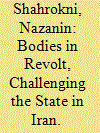

|
|
|
|
|
| Summary/Abstract |
The protests that erupted across Iran in 2022 after the death of a woman arrested for noncompliance with a headscarf requirement were not only about religious dress codes. They were a culmination of years of growing discontent over broader questions involving the place of women in the Islamic Republic and other grievances about the reach of an overbearing state and perceived social and political injustices. The erosion of civil society has made it difficult to sustain the protests’ momentum, as the state moves to co-opt businesses and the public into enforcing its decrees, but the uprising is part of a longer-term, nonlinear process of dissent-driven change in Iran.
|
|
|
|
|
|
|
|
|
|
|
|
|
|
|
|
| 2 |
ID:
168252
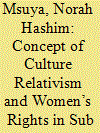

|
|
|
|
|
| Summary/Abstract |
This article discusses the challenges of the realization of women’s rights in relation to the concept of culture relativism in sub-Saharan Africa. It examines how the concept of culture is misconstrued with a traditional hierarchy and patriarchy approach that intervenes in the realization of women’s rights in sub-Saharan African states. Many societies are concerned that the promotion of gender equality would interfere with local culture; hence they feel that gender equality should not be promoted for ethical reasons. Women have been left with the unpleasant situation of choosing between their rights or their culture. Through secondary analysis and a critical review of the literature, the article engages in the debate on cultural diversity and gender equality, to challenge the existing stereotypes in sub-Saharan African cultures. It argues that traditional and cultural practices should adhere to the values of equality and human rights. The article proposes that cultural considerations will have to yield whenever a clear conflict with human rights norms becomes apparent.
|
|
|
|
|
|
|
|
|
|
|
|
|
|
|
|
| 3 |
ID:
168242
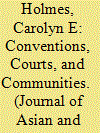

|
|
|
|
|
| Summary/Abstract |
The Convention for the Elimination of All Forms of Discrimination Against Women is central in outlining the gendered dimensions of human rights. India ratified this treaty with the reservation that it would be complied with only in accordance with the religious personal law. This article will examine the ways in which the convention interfaces with religious personal law, and the efficacy of the convention in both top-down and bottom-up reform of religious personal laws, as well as secular laws
|
|
|
|
|
|
|
|
|
|
|
|
|
|
|
|
| 4 |
ID:
076320
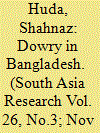

|
|
|
|
|
| Publication |
2006.
|
| Summary/Abstract |
Marriage negotiations for Bangladeshi Muslims involve various financial transactions including primarily the religiously sanctioned dower (mahr). Added to mahr, the practice of dowry or joutuk, demands made by the husband's side to the bride's side, have in the last few decades become a widespread practice supported neither by state law nor personal laws, but apparently designed to strengthen traditional patriarchal assumptions. Based on detailed fieldwork, this article discusses the historical assimilation of dowry practices in Bangladesh, including debates regarding its social ramifications on women's rights in Bangladesh, linked now to growing evidence of dowry-related violence. The existing dowry practices, despite legal intervention, continue to compromise women's rights in Bangladesh.
|
|
|
|
|
|
|
|
|
|
|
|
|
|
|
|
| 5 |
ID:
174557
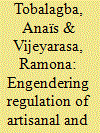

|
|
|
|
|
| Summary/Abstract |
This article argues that adopting a gender perspective when regulating artisanal and small-scale mining (ASM) is both necessary and achievable. The authors analyse women’s often-ignored needs and experiences as workers, decision-makers and affected community members in the ASM sector. To address these concerns, this article sets out standards for regulating ASM to guarantee women’s access to services and information and women’s decision-making and representation; to address the specific risks women face in the sector; and to provide access to effective remedies. The authors use international instruments to identify good practice benchmarks from which legislators and policymakers can draw. The article also notes where global norms fall short of addressing women’s rights in ASM. Some of the limitations of this approach are also acknowledged, notably the challenge of establishing gender-responsive laws that can be feasibly and effectively implemented. Nonetheless, the proposed approach should be favoured to better respond to the highly masculinised nature of the sector and the differentiated impacts of ASM on men and women while recognising women’s roles as beneficiaries and productive agents of the sector.
|
|
|
|
|
|
|
|
|
|
|
|
|
|
|
|
| 6 |
ID:
116541
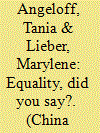

|
|
|
|
|
| Publication |
2012.
|
| Summary/Abstract |
After 30 years of economic reforms, what is the comparative situation of men and women in the People's Republic of China? How can we analyse the policies for promoting gender equality? Have inequalities that existed in Mao's China disappeared now? Or have factors such as the liberalisation of the labour market and the single child policy merely shifted the boundaries of such inequalities and even created others? This article looks at the ways in which the equality issue is dealt with, both by the government and by the All China Women's Federation and feminist organisations. It seeks to show which inequalities are prioritised and what has been the state's place in contemporary Chinese feminism.
|
|
|
|
|
|
|
|
|
|
|
|
|
|
|
|
| 7 |
ID:
190358
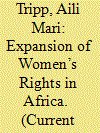

|
|
|
|
|
| Summary/Abstract |
Twenty years after the African Union adopted the Maputo Protocol on the Rights of Women in Africa, constitutional and legislative provisions on women’s rights have proliferated across the continent. Sub-Saharan Africa has achieved some of the world’s highest rates of improvement in women’s economic empowerment. African women have also been at the forefront of global efforts to increase female representation in political and business leadership, peacebuilding, and other areas. But progress on women’s rights has been weaker in the domain of family law on issues including inheritance rights and reproductive freedom. Africa also ranks lowest in closing the gender gap in education, despite major gains at the primary school level.
|
|
|
|
|
|
|
|
|
|
|
|
|
|
|
|
| 8 |
ID:
152449
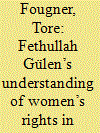

|
|
|
|
|
| Summary/Abstract |
This article examines the gender views of Islamist preacher Fethullah Gülen, a citizen of Turkey who has not only risen to global prominence since the early-2000s, but also gained a reputation for having ‘progressive’ views on the status of women in Islam. Considering Gülen’s writings on women’s identity, the relationship between men and women, and the role of women in public life, the article establishes that Gülen is more accurately depicted as deeply conservative with respect to women’s rights and gender equality. Furthermore, it identifies instances of tension between nature and nurture in Gülen’s conception of men and women, and locates his insistence on women naturally being of a subordinate kind within his sociopolitical project of creating an Islamic society.
|
|
|
|
|
|
|
|
|
|
|
|
|
|
|
|
| 9 |
ID:
189697
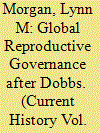

|
|
|
|
|
| Summary/Abstract |
The 2022 US Supreme Court decision Dobbs v. Jackson Women’s Health overturned the constitutional right to abortion, raising questions about the international implications of the ruling. The Dobbs decision reveals a growing rift in global reproductive governance between countries that rely on international human rights standards and those that do not. The global momentum is currently with the human rights contingent, but the Dobbs ruling reflects the logic of a global antiabortion coalition that would like each country to decide its own life and family laws, without interference from multilateral agencies, based on its own constitution, history, and traditions.
|
|
|
|
|
|
|
|
|
|
|
|
|
|
|
|
| 10 |
ID:
178471
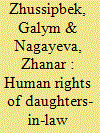

|
|
|
|
|
| Summary/Abstract |
The familial position and social status of daughters-in-law (kelins) in ‘traditional’ Central Asian families can be characterized as low, subservient and marginalized. By adopting normative human rights discourse, this paper argues that it is an example of the relativist challenge of cultural authenticity towards the universality of human rights, specifically women’s human rights. By using participant observation which can also be qualified as experiential research, serial in-depth and informal interviews, and an analysis of posts published in social media, the forces driving the persistence of a relativist approach to kelins’ human rights such as retraditionalization, the revival of conservative Islam, an unawareness of the human rights and the patterns of authority-subordination are explored. Through a conceptual framework combining Iris Young’s concept of the ‘five faces of oppression’ and the notion of ‘harmful traditional practices’, elaborated by international human rights documents, the study conceptualizes the family position and social status of the kelins as one of structural oppression or systemic injustice, created and legitimized by informal, harmful traditional norms and practices.
|
|
|
|
|
|
|
|
|
|
|
|
|
|
|
|
| 11 |
ID:
185367
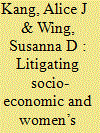

|
|
|
|
|
| Summary/Abstract |
Scholars debate the role of legal institutions in promoting human rights in Africa. Much of the discussion focuses on Anglophone countries and does not examine the gender of litigants. We propose a constitutionalism constrained perspective that argues that which and whose rights are adjudicated are shaped by the context of constitutional reform. Where reformists are primarily concerned with safeguarding civil and political rights, high courts may protect civil and political rights claims more often than socio-economic ones. Examining hundreds of human rights decisions issued by Benin’s Constitutional Court, we ask, which and whose rights does the court protect? We find the court is more likely to reject litigants’ claims on technical grounds when the issues involve socio-economic rights than when they concern civil or political rights. When a case is heard, moreover, the court finds violations of civil and political rights more often than socio-economic rights. Further, we find that an overwhelming percentage of litigants are men; women rarely appear as petitioners, although when women’s claims are heard, they are just as likely to succeed. Our findings about socio-economic rights and gender in Benin’s Constitutional Court have broader implications for understanding the limitations of constitutional reform.
|
|
|
|
|
|
|
|
|
|
|
|
|
|
|
|
| 12 |
ID:
181336
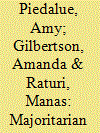

|
|
|
|
|
| Summary/Abstract |
This paper explores media coverage of instant ‘triple talaq’—a form of divorce practised by some Indian Muslims—and ‘love jihad’—a supposed trend of Muslim men coercing Hindu women into conversion and marriage. The Hindu Right position itself as champions of gender justice in the context of outlawing instant triple talaq, but in discussions of ‘love jihad’ sideline women’s rights (to choose their own religion and spouse) and focus on national security. This reveals the strategic use of women’s rights by the Hindu Right to further entrench its imagination of a secular Hindu nation threatened by the Muslim man.
|
|
|
|
|
|
|
|
|
|
|
|
|
|
|
|
| 13 |
ID:
175192
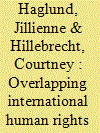

|
|
|
|
|
| Summary/Abstract |
With the proliferation of the international human rights regime, states confront a dense set of institutional commitments. Our knowledge of the influence of these commitments is limited for two reasons. First, scholars largely focus on the effect of treaty ratification on states’ human rights behavior, but states engage with these institutions after ratification via regional human rights court rulings and UN recommendations. Second, scholars often examine these institutions in isolation. The institutions do not operate in isolation, however, nor do states necessarily consider the requests they receive from these institutions independently. In this article, we introduce the Women’s Rights Recommendations Digital Database (WR2D2), which maps the various recommendations international women’s rights institutions make on European states. We begin by discussing the importance of recommendations from international institutions and their relationship with commitment and compliance. We then describe the data collection effort, including two dimensions on which recommendations made to European states vary – precision and action. Next, we report descriptive statistics from the dataset, including regional and temporal trends. We conclude with a discussion of the multifaceted research agenda that this new dataset can facilitate.
|
|
|
|
|
|
|
|
|
|
|
|
|
|
|
|
| 14 |
ID:
192012
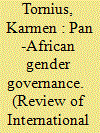

|
|
|
|
|
| Summary/Abstract |
The African Union (AU) has developed an elaborate gender governance architecture, including gender machineries and women’s desks, policy frameworks, path-breaking women’s rights laws, and ongoing campaigns on women’s rights–related issues. At the same time, the member states’ engagement with this architecture is at best lukewarm, with a lack of domestication, compliance, and accountability. This paradox is addressed in this article by developing the theoretical thinking around aspirational politics (Martha Finnemore and Michelle Jurkovich, ‘The politics of aspiration’, International Studies Quarterly, 64:4 [2020], pp. 759–69) and political brokers (Stacie E. Goddard, ‘Brokering change: Networks and entrepreneurs in international politics’, International Theory, 1:2 [2009], pp. 249–81), showing the social and relational origins of pan-African gender governance. In doing so, the article examines how ‘aspirational politics’ can be operationalized to examine the sociocultural and political production of shared future imaginaries. The paper focuses on AU femocrats as the key actors for AU’s aspirational gender agenda and argues for their importance as political brokers between AU member states, donors, UN agencies, and civil society organisations. By mobilizing actors and facilitating common ground and agreement, their institutionalized broker position allowed for various political entrepreneurs to emerge and thrive. At the same time, their pursuits are met with ‘aspirational fatigue’ or outright contestation by the member states. The case of the AU demonstrates how aspirational politics is not a ‘phase’ leading to norms governance but part and parcel of normative negotiation and engagement.
|
|
|
|
|
|
|
|
|
|
|
|
|
|
|
|
| 15 |
ID:
182683
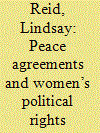

|
|
|
|
|
| Summary/Abstract |
Approximately one-quarter of civil war peace agreements contain some reference to gender, prompting the question of whether or not gender provisions within peace agreements are effective tools for improving women’s rights following conflict. As calls by the United Nations and the international community place increasing emphasis on women’s involvement in peace processes, this article generates insight into whether peace agreements, a key component of peace processes, help to spur greater political rights for women. The theoretical expectations of the article posit that peace agreements generate legal frameworks for post-conflict states. Specifically, peace agreements have the potential to tie actors’ hands to new policies and generate shifts in societal norms and practices; the direction of new policies and practices, however, is dependent on the contents of agreements. When agreements are gender-inclusive, they increase the likelihood of improvements in women’s political rights. The expectations are quantitatively tested using civil war peace agreements signed between 1981 and 2011. The findings indicate that the content of agreements matters; gender-inclusive agreements lay the foundations for improvements in women’s political rights following conflict. The article demonstrates that peace agreements, when crafted to include gender provisions, are meaningful tools that international and domestic actors can harness to strengthen women’s rights after civil war.
|
|
|
|
|
|
|
|
|
|
|
|
|
|
|
|
| 16 |
ID:
169445
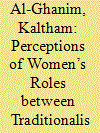

|
|
|
|
|
| Summary/Abstract |
Women’s participation in public life in the Arabian Peninsula is affected by tradition and limits their opportunities for socio-economic development. This study focuses on the social structures that impose gender inequality. Through in-depth focus group discussions with groups of men and women in different age groups and including both working and non-working individuals, gender roles are examined and the view of the different groups of men and women in Qatar of the roles that women are supposed to play inside and outside the home. Although some changes are occurring due to modernization, including education and other government policies, they are proving relatively minor: obstacles include deep-rooted kinship structure and cultural elements that limit women’s participation in the public sphere.
|
|
|
|
|
|
|
|
|
|
|
|
|
|
|
|
| 17 |
ID:
173197
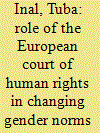

|
|
|
|
|
| Summary/Abstract |
The diffusion of international human rights norms through the enforcement of international human rights law by courts has been explored by both scholars of international relations and international law. Turkey, which has been a state party to most international human rights treaties despite being a major violator of human rights, is the case in this paper. It examines norm diffusion in the area of women’s rights through court action in a patriarchal culture protected and represented by a deeply patriarchal state and judiciary. By looking at the legal processes, domestic and international, through which the issue of the right of Turkish women to keep their maiden names after marriage has gone, this paper argues that norm diffusion through court action can be triggered even in difficult cases such as changing gendered norms and describes the conditions and mechanisms that make these changes more likely.
|
|
|
|
|
|
|
|
|
|
|
|
|
|
|
|
| 18 |
ID:
150339
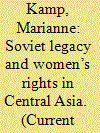

|
|
|
|
|
| Summary/Abstract |
"While Soviet efforts to promote gender equality are not openly celebrated, the idea planted in the region during that now-disdained era—that men and women should be equal under the law—is still holding fast.”
|
|
|
|
|
|
|
|
|
|
|
|
|
|
|
|
| 19 |
ID:
119902
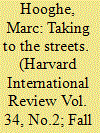

|
|
|
|
|
| Publication |
2012.
|
| Summary/Abstract |
Since 2011, various European countries have experienced periods of intensive political turmoil, with mass demonstrations that have sometimes turned violent. The high level of mobilization contradicts the often-expressed idea that young generations are no longer interested in politics, but hit the hardest by the economic downturn, the youth are most motivated to mobilize themselves.
|
|
|
|
|
|
|
|
|
|
|
|
|
|
|
|
| 20 |
ID:
171861


|
|
|
|
|
| Summary/Abstract |
Muslim personal laws in India have never been systematically codified, in marked contrast both to Hindu family laws in India and to Islamic family laws in much of the Muslim-majority world, both of which have been subject to a far greater degree of codification. This article examines the call being made by one prominent contemporary Muslim women's organisation, the Bharatiya Muslim Mahila Andolan (BMMA), for the wholesale codification of Muslim family laws in India as a pathway to protecting women's rights. Following a discussion of the wider context of India's uncodified Muslim personal law system, this paper offers a commentary on the BMMA's draft Family Law Act, first released in 2014. It demonstrates how this document synthesises discourses of women's rights drawn from a series of Qur’anic, constitutional and transnational reference points. By drawing from such diverse sources, and while legal codification in much of the Islamic world has instituted fundamentally patriarchal legal norms, the BMMA's proposed code articulates a distinctive, more gender-equal reading of Islamic family law.
|
|
|
|
|
|
|
|
|
|
|
|
|
|
|
|
|
|
|
|
|